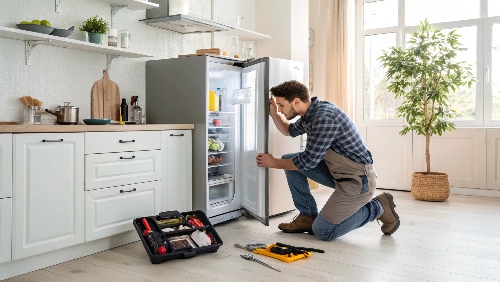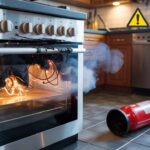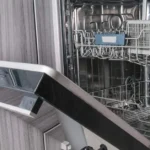Appliances that aren’t working efficiently can drain energy and drive up your utility bills. Whether it’s a refrigerator that runs nonstop or a washing machine that uses more water than necessary, these issues are costing you money every day.
Ignoring appliance problems can lead to increased energy consumption, resulting in higher monthly bills. Over time, these inefficiencies can accumulate, resulting in a substantial financial burden that could have been avoided with proper maintenance.
By repairing faulty appliances, you can restore their efficiency and reduce energy waste. Simple fixes, such as cleaning filters, repairing leaks, or replacing worn-out parts, can result in substantial savings on your utility bills. Suppose you’re not sure where to start. In that case, a professional appliance repair service can assess your appliances and get them running smoothly again, saving you both money and energy in the long run.
Understand the Connection Between Appliance Repairs and Energy Efficiency
Appliance malfunctions often lead to higher energy bills, but repairing them instead of replacing them can make a significant difference. Minor issues, such as worn-out seals or clogged filters, can cause appliances to work harder and consume more energy. Here’s how timely repairs can help you save energy and lower your monthly costs.

Why Appliance Efficiency Matters
Home appliances are essential to modern living, but they can also be one of the largest sources of energy consumption in a household. When appliances begin to operate inefficiently, due to wear, lack of maintenance, or damaged components, they use more power to achieve the same results. This not only leads to higher utility bills but also increases the strain on electrical systems and the environment.
Repairing appliances instead of replacing them offers a practical way to reduce energy use. By addressing specific faults early, appliances can often be restored to efficient operation, extending their lifespan while minimizing both energy costs and environmental impact.
For expert tips and guidance on keeping your appliances running efficiently, Beach 2 Bay Appliances provides trusted advice and support for homeowners in Florida.
Signs Your Appliances Are Wasting Energy
Identifying inefficiencies early is key to controlling energy waste. Appliances often give off clear signals when they are underperforming, but these signs are easy to overlook until a more serious breakdown occurs.
Common signs of energy-wasting appliances include:
- Sudden increases in electricity or water bills without additional usage
- Prolonged cycle times for tasks like washing, drying, or cooling
- Uneven performance, such as warm spots in a refrigerator or damp laundry after drying
- Unusual noises, excessive heat, or frequent cycling on and off
If any of these symptoms are present, the appliance may be consuming more energy than necessary due to internal faults or blocked components.
Common Appliance Issues That Lead to Energy Waste
Appliances are complex machines with many moving parts. When one component begins to fail or operates below standard, the entire system compensates by drawing more power. Here are some of the most common problems by appliance type:
Refrigerators
- Worn or cracked door gaskets cause cold air leakage, increasing compressor activity
- Dirty condenser coils reduce heat dissipation, forcing the system to work harder
- Faulty thermostats and defrost timers lead to temperature fluctuations and inefficient cooling
Washing Machines
- Clogged filters or blocked hoses reduce water flow and cleaning effectiveness
- Faulty temperature sensors may overheat water unnecessarily
- Unbalanced or damaged drums require longer cycles and waste electricity
Dryers
- Lint buildup restricts airflow, leading to extended drying times
- Malfunctioning moisture sensors prevent the dryer from shutting off at the right time
- Worn drum seals allow heat to escape, requiring longer and hotter cycles
Dishwashers
- Clogged spray arms or filters reduce water pressure and cleaning effectiveness
- Broken heating elements extend wash cycles without properly sanitizing
- Damaged door seals cause water leakage and disrupt temperature control
Repairing these common issues typically results in immediate improvements in efficiency and can delay the need for replacement by years.
Benefits of Repairing Over Replacing
In many cases, repairing a faulty appliance is more advantageous than replacing it, both economically and environmentally.
- Cost savings: Repairs generally cost a fraction of what it takes to purchase and install a new appliance
- Lower environmental impact: Repairing prevents appliances from ending up in landfills and reduces the need for new materials and energy in manufacturing
- Preservation of embodied energy: Each appliance contains energy already spent during its production; repair allows that energy to continue providing value
- Extended appliance life: Timely repairs can add years of productive use with improved efficiency and performance
For homeowners looking to reduce both energy costs and environmental impact, appliance repair is often the most practical and responsible choice.
Ready to Save Energy and Money with Appliance Repairs?
If you’re tired of high energy bills and malfunctioning appliances, Beach2Bay Appliance Service is here to help! By repairing your appliances instead of replacing them, you can restore efficiency, reduce waste, and see a significant drop in your utility costs. Don’t let minor issues turn into bigger, more expensive problems.
Call Beach2Bay Appliance Service today at 850-830-8306 and let our experts ensure your appliances are running at their best, saving you both energy and money in the long run. We proudly serve homeowners across Niceville, Destin, Fort Walton Beach, Miramar Beach, SanDestin, 30A, Hammock Bay, and South Walton coastal areas in Florida.
Author Profile
- John Raymond Hagler
- Beach2Bay Appliances is a trusted name in Florida for professional appliance repair services. Serving homeowners, realtors, and property managers, our experienced team focuses on reducing costly breakdowns and maximizing appliance efficiency. Committed to reliability, transparency, and customer care, we help maintain the value and functionality of homes and rental properties through routine service and urgent repairs.
Latest entries
 BlogsAugust 30, 2025Oven Smells Like Burning While Cooking? Here’s the Solution
BlogsAugust 30, 2025Oven Smells Like Burning While Cooking? Here’s the Solution BlogsAugust 29, 2025Why Your Dishwasher Isn’t Cleaning Dishes and How to Fix It
BlogsAugust 29, 2025Why Your Dishwasher Isn’t Cleaning Dishes and How to Fix It BlogsAugust 29, 20257 Reasons Your Microwave Isn’t Working and How to Fix It Quick
BlogsAugust 29, 20257 Reasons Your Microwave Isn’t Working and How to Fix It Quick BlogsAugust 27, 2025Why Your Refrigerator Isn’t Cooling and How to Fix It
BlogsAugust 27, 2025Why Your Refrigerator Isn’t Cooling and How to Fix It
